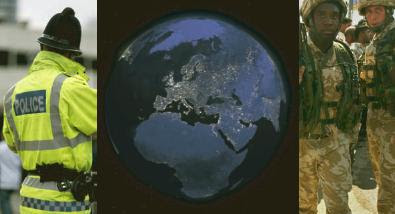An Unquiet World

- The UK has not made enough of its natural advantages in developing a close relationship with India.
- Our civil liberties at home and our human rights record abroad matter and must be upheld in a consistent manner.
- The broader Middle East is a region in turmoil. ... Iraq has made some aspects worse.
- The risk and danger of the proliferation of weapons of mass destruction have been increased by the situation in the broader Middle East.
- The continuing importance of the transatlantic Alliance.
- The vital need for functioning US European relations.
- UK security involves close partnership in Europe.
- Functioning international law and invigorated international institutions protect and promote our interests. ... The UK should put effort into UN reform generally and Security Council enlargement in particular.
- The identity of the British people needs to be rebuilt to include minority communities on the basis of shared values and active equal citizenship.
- The UK is without arrangements in place for guaranteed energy supply or a strategic reserve available for emergencies.
- Policies being pursued by European governments towards Russia and the countries on the EU’s borders in the Mediterranean and Eastern Europe do not serve the political and security interest of member states as well as they could and should.
- It is urgent for EU leaders to agree with Turkey a way forward on the accession negotiations.
- Our armed forces which serve the nation with great professionalism round the world are overstretched and there is no reserve available for emergency. ... Their mission no longer corresponds to the real security requirements of the nation.
- Conduct a Defence review not with the aim of inflicting further cuts, but of ensuring that our armed forces have been asked to do the right job, are properly equipped and trained and are employed on the right terms and conditions.
- Establish a dedicated force with a permanent command headquarters for homeland defence and security, to provide assistance as and when requested to the civil authorities in the event of a major terrorist incident or other national emergency.
- Maximise the influence of its considerable range of soft power assets (such as the British Council, the BBC World Service, and British university system). British diplomacy, an asset neglected by the Labour Government, should be revitalised.
- Create a National Security Council in the Cabinet Office. The FCO should be brought back from the sidelines. The FCO and DfID should develop a dedicated civil expeditionary capability.
- Adapt the method of budgeting for spending on the external aspects of national security by relevant departments (FCO, MOD, DfID) to support a national security approach and alter spending patterns to fund more adequately reform and nation building programmes relevant to the establishment of open societies.


0 comments:
Post a Comment